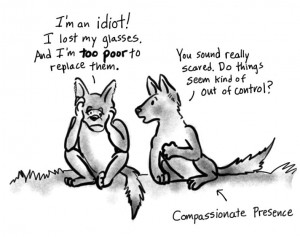A Crash Course in Listening: 3 Do’s and Don’ts
One of the biggest concerns people have when they encounter a bereaved individual isn’t (strangely enough) how the bereaved person is doing, but “what do I say to them?”
The secret to “what to say” is simple in theory, but ironic in reality because honestly, “saying something” isn’t the key. We feel a lot of pressure to say something but the best thing you can do is to listen with compassion.
When you feel the pressure to open your mouth, start with a simple but sincere question, “How are you holding up?” and then … listen.
Listening is THE KEY when it comes to talking to someone who is in mourning. Unfortunately, instead of listening, a lot of us end up saying something unhelpful or even hurtful to get away from the pain. Here are some examples:
- An “at least” statement that is intended to help the person see the “silver lining” (These are the worst. Don’t use them, EVER. Let the grieving person find their own silver lining, if one even exists. “Good intentions may do as much harm as malevolence if they lack understanding.” – Albert Camus)
- a brilliant piece of wisdom that will perfectly solve “their problem” (Trust me, no such piece of wisdom exists)
- a way to get out of the “sad” conversation and on to something fun (Because we think that our job is to make the grieving person “feel better”, e.g. less sad and more happy. More on this later.)
Now, let me encourage you: listening doesn’t come naturally to ANYONE. But it’s a skill that can bring huge relational and personal benefits and is worth practicing and trying out.
So here’s the crash course in listening:
3 Do’s and Don’ts
Don’t
 1. Judge. Do not pass judgement on someone when they’re honestly sharing with you. Passing judgement means you are more concerned with some sense of “right or wrong” than you are with the person or their pain. You might just miss a beautiful opportunity to deepen your level of compassion and the honor of caring for someone.
1. Judge. Do not pass judgement on someone when they’re honestly sharing with you. Passing judgement means you are more concerned with some sense of “right or wrong” than you are with the person or their pain. You might just miss a beautiful opportunity to deepen your level of compassion and the honor of caring for someone.
2. Give Advice. Unless you are being asked for advice it is wise in moments like these to avoid the temptation. Advice can feel like a minimization of their experience, for example: if I’m sharing with you about the death of my grandmother and you tell me, “You should write her a letter because you miss her,” it stops me in my tracks and deflects my grief by offering a “quick fix.” Grief becomes a problem similar to a broken sprinkler that just needs a new part and it’s good as new. But grief doesn’t work like that.
Bottom line: bereaved people don’t want suggestions, they just want to be heard.
3. Share personal anecdotes (this is the hardest for me). These are sometimes appropriate if you are trying to make a connection or have a specifically perfect story to share, but usually it’s just a re-claiming of the conversation. You’re communicating to the person that your response is more important to you than what they are sharing.
*Couple of side notes on this one: In the context of normal conversations, personal stories are a normal part of the flow. But when you are really trying to listen to someone, resist the urge. You’ll be glad you did.
And if you really want to let someone know that you identify with the pain their experiencing, which can be very comforting, all you have to say is, “I can relate to that,” and then let them continue sharing.
So, when listening:
Do
1. Be attentive. The most important thing with showing attentiveness is maintaining eye contact. Even if the person you’re listening to is moving their eyes around, keep your focus on them. Also, pay attention to your body language and make sure that you are facing the person with an attitude  of relaxed openness, being turned away or closed can illustrate disinterest. These non-verbals are huge and very often louder than your words. If they say something that is particularly heavy or painful, you can make affirming nods or verbal notes. This lets them know that you’re really cued into what they’re saying.
of relaxed openness, being turned away or closed can illustrate disinterest. These non-verbals are huge and very often louder than your words. If they say something that is particularly heavy or painful, you can make affirming nods or verbal notes. This lets them know that you’re really cued into what they’re saying.
2. Ask concrete questions. Who, what, when, where, and how questions show that you are paying attention and that you want to know more. Avoid “why” questions, these can put people on the defensive and are generally conclusion seeking. For example: “how did that make you feel?” versus “why do you feel that way?” Asking “how” keeps the conversation open while “why” can sound accusatory.

3. Offer compassion statements. These statements attempt to connect an emotion to an experience. For example, “It sounds like the loss of your son has changed so many areas of your life” or “It seems like your mom’s passing has impacted you more profoundly than you thought.”
And finally, I love when people say, “Thank you so much for sharing that with me.” It makes me feel like what I shared was received, appreciated and heard.
And now, thank you for reading. My deep hope is that you’ll practice these when you find yourself with a person who just needs to be heard. It will profoundly impact the way you care for people. Give grace to yourself as you practice and be intentional about looking for that special moment where a person comes across your path and needs the gift of being heard. You can give it to them.





1 Comment
Molly – This is great advise for all situations! I like what we learned yesterday “listen with Dumbo ears.” I love #2 ask concrete questions, I realize that I need to not give advise unless asked for it. I cannot even remember anyone asking for my advise, so that is pretty interesting if you pay attention to your own bad habits. These all are great reminders for me.
I appreciate your blogs and insights, great job!